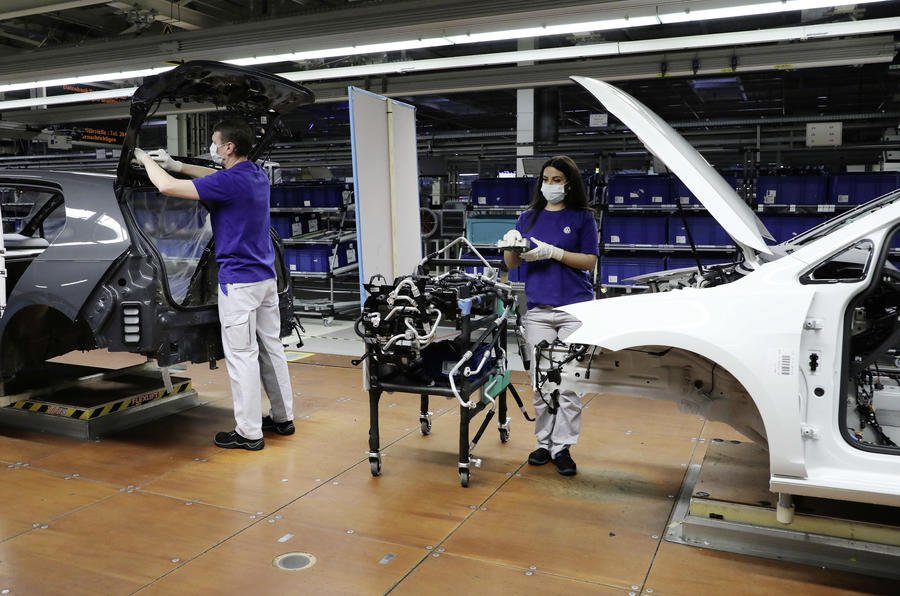As countries pass what is hopefully the peak of their coronavirus outbreaks, focus is shifting onto ways to ease lockdown restrictions and restart society. For the automotive industry, that means getting back to making cars.
The disruption has been huge. The European Car Manufacturers' Association estimates that across theEU and the UK, shutdowns have resulted in the lost production of more than two million cars – billions of pounds of lost revenue.
The Volkswagen Group, PSA Group, Toyota and Volvo are among the firms to have resumed operations at some European plants. But with business very much not as usual, making cars has become a lot more complicated.
New cars are assembled from thousands of components by hundreds of staff, working in close proximity and handling the same tools and parts. Production lines are designed to build cars as quickly as possible, rather than for social distancing.
The first step is ensuring component supply chains from outside companies are in place. Their failure was why many plants suspended production initially. It's the reason the first VW Group factories to resume were component plants.
The absolute priority is keeping staff safe and healthy. Both the VW Group and PSA Group have developed around 100 safety measures for their plants. Bernd Osterloh, chair of the Volkswagen Works Council employee body, said: "We have never developed, produced and sold vehicles under these conditions before."
Firms are ensuring through checks and tests that staff entering factories are healthy.
The PSA Group will take the temperature off staff entering all its plants – including Vauxhall's Ellesmere Port facility when production resumes there once UK restrictions allow – and require them to self-monitor for symptoms.
Volvo's plants in Sweden and Belgium resumed production last week, with staff offered voluntary temperature and pulse oximeter tests on entry.
Seat will introduce polymerase chain reaction antigen tests – which identify who has had Covid-19 – for 15,000 staff at every Spanish VW Group plant. Notably, the results will be used for a scientific study into the virus. Dr Bonaventura Clotet, head of Seat's medical scientific committee, said: "Testing all employees is the best way to minimise the spread of the virus."
Ferrari, which plans to resume work at its Maranello site in early May depending on Italian government restrictions, has launched a voluntary testing scheme for employees and their families, and staff of any of its suppliers. It is also offering free insurance cover and accommodation and medical support for any employees who are required to self-isolate.
Firms also need to ensure employees don't spread the virus once inside a factory. This is largely being done through basic rules on employee health, such as requiring hand washing, and the provision of hand sanitiser and personal protective equipment (PPE) such as face masks. Workers entering Toyota's Yaris plant in France are given bags containing face masks, sanitiser and an individual pen, and bottled water is offered in place of shared fountains.
Ensuring social distancing between employees is key. That has led to firms reworking the layout of plants, introducing one-way systems, ensuring all non-fire doors are open and marking out spacing in communal break areas. At one of its US plants, Ford is testing a bracelet that vibrates when staff get too close to each other.
Where it's not possible to keep staff apart on production line work stations, physical barriers such as plastic sheets have been installed. There are also regular production breaks so that tools and work stations can be cleaned, with shift timings split to eliminate staff crossover.
Predictably, these measures will have a dramatic impact on output. Estimates suggest Toyota will initially produce 50 cars per day at its French plant, compared with 1400 usually. Seat was due to reopen its main Martorell plant earlier this week, with one shift on each of the three production lines (for the Ibiza, Arona and Audi A1). Lines will initially run at one-third capacity, producing around 325 cars a day.
Once the plants are running, firms are hoping to gradually increase production as they adjust to measures and lockdown restrictions are lifted. VW, which began by opening its plants in Zwickau, Germany (where the crucial ID 3 is being produced) and Slovakia, has a four-phase plan to eventual full production.
Seat is due to add second shifts on each production line in May, raising production to around 650 cars per day, and hopes to resume full production in June. But that depends on a lifting of restrictions: the firm has warned it cannot achieve pre-virus production levels with the measures in place. Sources at other companies say they simply don't know what level of production can ultimately be achieved with restrictions in place.
Initially, that won't be an issue because of the reduced demand for new cars. The closure of dealerships caused sales to plummet in March and it could be months before they pick up. The PSA Group predicts sales in Europe will drop 25% in 2020. But by taking the first tentative steps to restart production, car firms are hoping they will be ready to capitalise when demand does return.
Car sales slump by more than 50% across Europe during March
A total of 853,077 cars were sold in March in countries that are part of the EU, the European Free Trade Association and the UK, according to the European Car Manufacturers' Association. That's a 51.8% year-on-year decline.
Falls in individual countries reflected the date lockdowns were introduced and their severity. In Italy, the first country to suffer a major Covid-19 outbreak, sales declined by 85.4%. They fell by 72.2% in France, 69.3% in Spain and 44.4% in the UK.
The FCA Group, based in Italy, was the worst-hit car maker, with the 22,070 sales across its brands marking a 74.4% year-on-year drop. The PSA Group suffered a 66.9% fall, with the Renault Group and Ford also posting declines of more than 60%.
Nouvelles connexes



